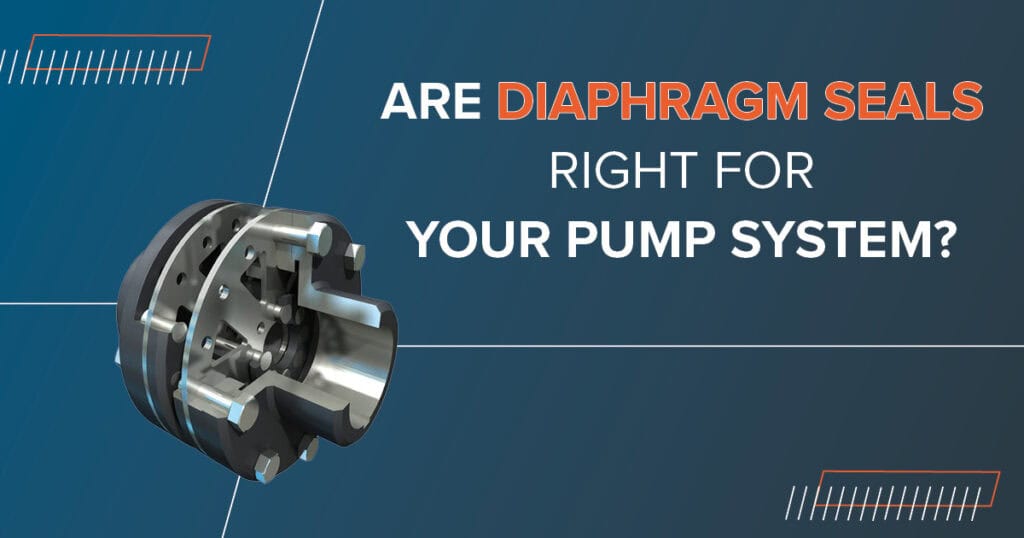When it comes to choosing the right components for a pump system, one of the crucial decisions involves selecting the appropriate sealing technology. Diaphragm seals are a popular choice for many applications, but are they the right fit for your specific needs? It is important to understand the key considerations, benefits, and potential drawbacks of diaphragm seals in pump systems. This research can help you make a more informed decision.
What Is a Diaphragm Seal?
Diaphragm seals are also known as membrane seals. These seals are designed to protect sensitive instrumentation from corrosive, viscous, or otherwise harmful process fluids. They consist of a flexible diaphragm that transmits pressure from the process fluid to the measuring instrument by using a fill fluid. This process ensures accurate readings without direct contact between the fluid and the instrument.
Advantages of Diaphragm Seals
- Corrosion Resistance—Diaphragm seals are highly effective in preventing corrosive fluids from coming into contact with the sensitive parts of the pump’s instrumentation. This is particularly beneficial in industries such as chemical processing where aggressive fluids are common.
- Versatility with Viscous Fluids—Diaphragm seals excel in applications involving viscous slurries or crystallizing fluids that might otherwise clog or damage conventional seals. The seal’s design ensures these challenging fluids can be handled without compromising the performance or lifespan of the pump system.
- Isolation and Safety—By isolating the process fluid from the measurement device, diaphragm seals enhance the safety and integrity of the system. This isolation is crucial in applications where fluid contamination could lead to hazardous conditions or product spoilage.
- Temperature Tolerance—Diaphragm seals can be constructed from a variety of materials, including Teflon, stainless steel, and elastomers. Each material is suited to different temperature ranges and chemical compatibilities. This flexibility allows diaphragm seals to be used in a variety of thermal environments.
- Improved Measurement Accuracy—By preventing direct contact between the process fluid and the measuring instrument, diaphragm seals can maintain the accuracy of pressure readings. This is essential in applications where precise measurement is critical to operational success.
Potential Drawbacks of Diaphragm Seals
- Initial Cost and Maintenance—Diaphragm seals can be more expensive up front compared to other seals. Additionally, they may require periodic maintenance or replacement. This is especially true in harsh environments where the diaphragm material could degrade over time.
- Fill Fluid Considerations—The fill fluid used within the diaphragm seal system must be compatible with both the process fluid and the operating conditions. Selecting the wrong fill fluid can lead to measurement inaccuracies or even damage to the seal itself.
- Installation Complexity—Installing diaphragm seals can be more complex than other types of seals. Proper alignment and filling are crucial to ensure the diaphragm operates correctly without introducing measurement errors or system inefficiencies.
- Response Time—In some cases, the presence of a diaphragm seal can slightly delay the response time of the pressure measurement. While this might be negligible for many applications, it could be a critical factor in high-speed or highly dynamic systems.
Is a Diaphragm Seal Right for Your Pump System?
To determine if a diaphragm seal is suitable for your pump system, consider the specific requirements of your pump application. Important factors include process fluid properties, initial costs compared to long-term benefits, and environmental conditions.
Diaphragm seals can provide a robust solution for protecting instrumentation in challenging environments. However, their suitability depends on the specific demands of your pump system. By carefully evaluating the factors mentioned above, you can make a well-informed choice that enhances both the performance and durability of your system.
To learn more about diaphragm seals and to find the best sealing technology based on your specific application, equipment, and budget, contact the pump experts at DXP Pacific today.

